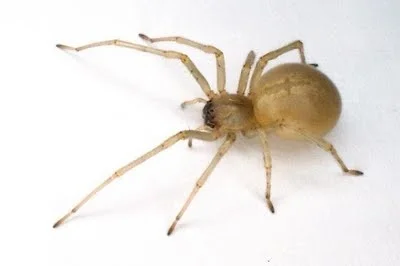The yellow sac spider (Cheiracanthium mildei and Cheiracanthium inclusum) is a common arachnid found across Canada, particularly in regions like Ontario. These spiders are often mistaken for other species, such as the yellow garden spider or black and yellow spider, due to their pale yellow or beige coloration. Unlike the orb-weaver spider, which builds intricate webs, the yellow sac spider is a hunter that roams at night, making it more likely to enter homes.
Identifying the Yellow Sac Spider
The yellow sac spider is typically small, measuring about 6-10 mm in body length, with long, slender legs. Its color ranges from pale yellow to light green or beige, and some may have faint stripes or darker markings. Unlike the black-footed yellow sac spiders, which has distinct dark tips on its legs, the northern yellow sac spider appears more uniform in color.
One key characteristic is the silken sac they create for shelter, often found in corners, under furniture, or along ceilings. This sac spider yellow retreat helps distinguish it from other species like the white house spider or triangulosa spider, which build different types of webs.
Habitat and Behavior in Canadian Regions
In Canada, the yellow sac spider thrives in both indoor and outdoor environments. They are commonly found in:
- Homes (especially in basements, attics, and window frames)
- Gardens and shrubs (often confused with the yellow garden spider)
- Agricultural areas (sometimes called the agrarian sac spider)
Unlike the yellow orb weaver, which stays in its web, the yellow sac spider actively hunts at night, preying on insects and other small arthropods. During the day, they retreat into their silk sacs, which is why they are often called sack spiders.
Are Yellow Sac Spiders Dangerous?
Many people wonder, “Are yellow sac spiders dangerous?” While they are not as venomous as some other species, their bite can cause mild to moderate reactions. A yellow sac spider bite may result in:
- Redness and swelling
- Mild pain or itching
- Rare allergic reactions
Comparatively, the black and yellow spider (like the black-footed yellow sac spider) has a similar bite effect. However, they are not considered highly poisonous, unlike the brown recluse or black widow. Still, it’s best to avoid handling them.
Signs of a Infestation
If you suspect yellow spiders in your house, look for these signs:
- Silken sacs in corners, behind furniture, or near windows
- Small yellow or beige spiders crawling at night
- Bite marks (though these are rare and often misattributed)
In Ontario and Alberta, these spiders are more active during warmer months but may seek shelter indoors when temperatures drop.
Effective IPM Pest Solutions for Yellow Sac Spiders
At IPM Pest Solutions, we focus on Integrated Pest Management (IPM) strategies to control spiders without excessive pesticide use. Here’s how we approach it:
1. Inspection and Identification
Properly identifying the spider is crucial. Many confuse the yellow sac spider with the yellow orb spider or corn spider, but their control methods differ.
2. Sealing Entry Points
Since these spiders enter homes through cracks and gaps, sealing windows, doors, and foundation gaps helps prevent infestations.
3. Reducing Clutter and Hiding Spots
Removing piles of debris, old boxes, and excess vegetation near the house discourages yellow sac spiders from settling in.
4. Natural Predators and Biological Control
Encouraging natural predators like birds and other beneficial insects can help keep spider populations in check.
5. Targeted Treatments
If necessary, eco-friendly treatments can be applied to high-risk areas without harming other wildlife.
Preventing Spiders in Your Home
To minimize encounters with yellow spiders in Canada, follow these tips:
- Keep indoor spaces clean and clutter-free
- Use yellow or sodium-vapor outdoor lighting (which attracts fewer insects, reducing spider prey)
- Regularly dust and vacuum corners, ceilings, and hidden spaces
- Store firewood and garden materials away from the house
Common Misidentifications in Canada
Many spiders resemble the yellow sac spider, leading to confusion:
- Yellow garden spider (Argiope aurantia) – Larger, with bold black and yellow stripes
- Corn spider – Another name for certain orb-weavers, not a true sac spider
- Black with yellow spider – Could refer to several species, including some jumping spiders
- White house spider – Often mistaken due to similar size but lacks the yellow sac spider’s hunting behavior
Safe and Effective Spider Control
While the yellow sac spider is not the most dangerous pest in Canada, its presence can be unsettling. By understanding their behavior and implementing IPM Pest Solutions, homeowners can manage these spiders effectively. If you’re dealing with yellow spiders in Ontario, Professional pest control ensures safe and long-term prevention.
For expert assistance in handling sac spiders and other pests, trust IPM Pest Solutions to provide eco-friendly, effective, and reliable pest management tailored to Canadian homes and businesses.


